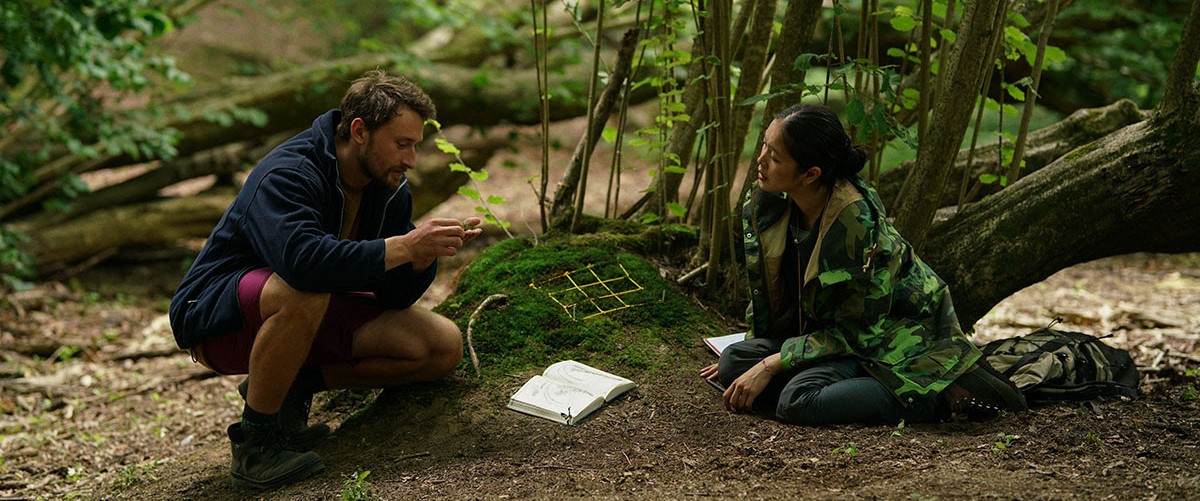Early on in Bas Devos’ “Here,” Stefan (Stefan Gota), a Romanian construction worker living in Brussels, stands with a friend, watching the city trains roll by. The friend tells Stefan that the first trains in Europe “came through here.” Later in the film, Stefan stands next to Shuxiu (Liyo Gong), a woman he just met, looking out over the city from the wooded spot they’ve been exploring. After a long silence, he tells her the first trains in Europe “came through here”. There’s no further discussion in either moment. It’s just a small factoid offered up by one friend to another, which is then offered to someone else. The second exchange clarified the first, underlining the significance. In “Here,” what matters is not what is offered, but the act of offering itself.
This philosophical standpoint sounds rather grandiose when written down, but it’s soothing and intriguing in Davos’ approach. “Here” is experiential rather than story-driven. The big things happen not in the words, but through gestures, physical and emotional. Gestures like showing someone something. Pointing at something you want them to see. Opening your hands to show someone what you are holding. Offerings, all. And so even though “Here” is a sparsely populated film, the feeling is that of a collective, a group created by the offerings—of conversation, listening, looking, giving—even in brief chance encounters.
Stefan and Shuxiu don’t intersect at all until maybe 40 minutes in. They meet on a rainy night when he comes into the restaurant for takeout and decides to eat there. There’s a flicker of a spark between them, awareness of the other as a full human being. They see each other. The next time they meet is also by chance.
Stefan is about to go home to Romania to visit family. Shuxiu is a bryologist, studying moss under a microscope by day, helping out in her aunt’s Chinese restaurant by night. Stefan is blue-collar, Shuxiu an academic. They circulate in totally different orbits. Shuxiu is first heard, not seen, speaking in voiceover, relating her strange experience of waking up and forgetting the names for things. She was left, temporarily, in “a nameless world”. Stefan tells his sister he spends his days “wandering,” and he does. Stefan is a true flâneur.
Devos’ film is also a flâneur. There are places to go, but there’s no rush to get there. Stefan makes a soup with the leftover vegetables in his fridge and ladles it into Tupperware containers. He visits his friend at work, he visits his sister at work, he goes to check on his car being worked on by a mechanic friend (Teodor Corban). Stefan brings containers of soup to everyone. It’s so quietly generous. His gesture is not remarked on, but everyone eats the soup. Making food for people is so intimate, it’s such a casually loving thing to do. The soup thing, just like the trains comment, doesn’t reveal how significant it is until it repeats.
The film could be read metaphorically or literally. Under the microscope, Shuxiu’s moss is a luscious green proliferating universe, with no boundaries, no limit to its growth. Moss is tough, moss will push itself through concrete, moss will survive. “Here” drifts back and forth between the city and nature. Brussels is intimate enough that nature is incorporated into it, with spaces of green, and a whole forest right outside of town. Nature exists in the city, but all those construction cranes viewed in the first scene tells us nature will perhaps lose the battle.
Boris Debackere’s sound design is exquisite, and extremely important in establishing the meditation and sometimes dreamlike mood. There is a symphony of buzzing bees, whispering wind, rustling long grasses, bird chirps, woodpeckers, distant booms of construction. Sometimes most of the sound drops out, leaving only the woodpecker, or the bees. This has a disorienting almost dizzying effect. Stefan and Shuxiu walk through the woods, and sometimes their footsteps are heard crunching on the dirt, sometimes the footsteps are dropped from the mix, leaving only the buzzing of bees. It’s a startling sound design, dramatic but in a very unobtrusive way.
Cinematographer Grimm Vandekerckhove focuses his camera on the natural world in all its microscopic splendor. He gets as close as possible to a raindrop trembling on the edge of a leaf, the deep greens of moss spreading across tree trunks. Nature shots are interspersed throughout: even in city scenes, there’s an awareness of nature, still out there, right over there.
The film’s title is thought-provoking. It’s like a children’s picture book: here is the city, here are the woods. Here is always right now. The saying isn’t “live in the there and now”. Here is close, whereas “there” is far. Shuxiu gestures for Stefan to come close, so she can show him the moss: “Here, look.” Stefan passes out soup, “Here’s some soup.” Trains come through here, did you know that? Stefan and Shuxiu don’t even exchange names, but they name everything else. It’s comforting to be two flâneurs, wandering in the woods, pointing and saying, “Here, look,” making offerings of themselves, of their attention, their knowledge, their time. In a “nameless world,” maybe that’s all we can really strive for. In the here and now, it’s everything.




















